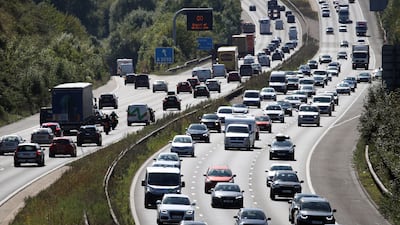Living near a busy road can be a noisy and stressful experience. The sound of roaring engines, honking horns and wailing sirens can make you feel as if your blood pressure is rising.
A new study published in JACC: Advances shows a clear association between traffic noise and an increased risk of hypertension. The findings call for public health measures to reduce exposure to noise.
Previous studies have shown a connection between noisy road traffic and an increased risk of hypertension, but strong evidence was lacking.
It was unclear then whether noise or air pollution played a bigger role.
However, the new research shows that exposure to road traffic noise itself can elevate hypertension risk. Even after adjusting for air pollution, the association between road traffic noise and high levels of tension was robust.
Assistant professor Jing Huang told The National: "Exploring the modification environmental factors of hypertension would help to develop preventive measures to mitigate the growing burden of hypertension.
"Despite the biological plausibility of the link between road traffic noise and hypertension risk, the quality of relevant evidence is low, and the role of air pollution remains to be clarified."
The study was a prospective one and used UK Biobank data that looked at health outcomes over time.
Researchers analysed data from more than 240,000 people aged 40 to 69 years who started out without hypertension.

They estimated road traffic noise based on residential address and the Common Noise Assessment Method, a European modelling tool.
Using follow-up data over a median of 8.1 years, they looked at how many people developed hypertension. They found that people living near road traffic noise were more likely to develop hypertension.
They also found that risk increased in tandem with the noise "dose".
These associations held true even when researchers adjusted for exposure to fine particles and nitrogen dioxide.
However, people who had high exposure to traffic noise and air pollution had the highest hypertension risk, showing that air pollution plays a role as well.
It is essential therefore to explore the independent effects of road traffic noise rather than the total environment.
The findings of the study can support public health measures as they confirm that exposure to road traffic noise is harmful to our blood pressure.
Policymaking may alleviate the adverse effects of road traffic noise as a societal effort.
Dr Huang told The National: "It’s very important to carry out reasonable urban planning such as setting a certain distance from the residential areas to the major roads, improving road conditions, and conduct public health measures such as setting stricter noise guideline and enforcement, and investing advanced technology on quieter vehicles, etc."
This study is the first large-sized prospective study directly addressing the effect of road-traffic noise on the incidence of newly-diagnosed hypertension.
As a follow-up, field studies are under way to better understand the pathophysiological mechanisms through which road noise affects hypertension.
Dr Huang told The National: "We are now carrying on a field study to explore the potential biological mechanisms such as activation of the hypothalamus-pituitary-adrenal axis through which road traffic noise may affect our blood pressure."
For the time being, Dr Huang's advice to individuals who live near a busy road is to "take steps like closing windows or wearing ear plugs to mitigate their risk of hypertension".
"However, individuals, especially those living on a lower income, are powerless when it comes to mitigate the road traffic noise exposure themselves. Policymaking as a societal effort would be more helpful to alleviate the adverse impacts of road traffic noise."


